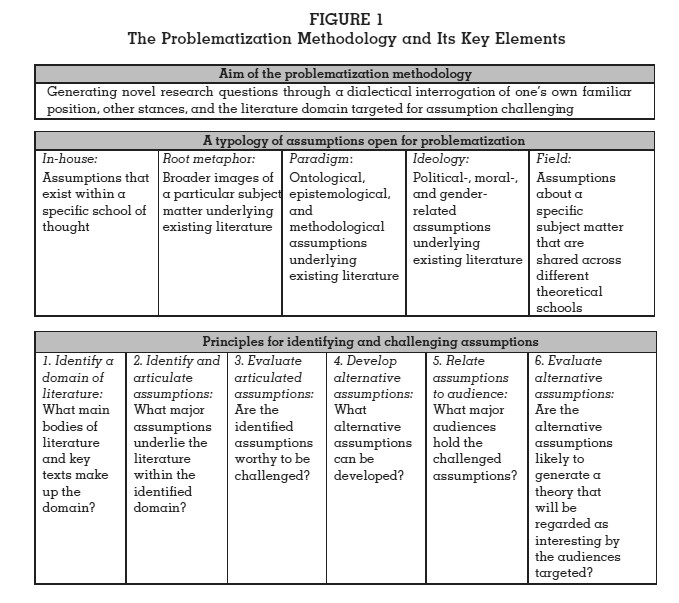Alvesson and Sandberg 2011: Generating Research Questions Through Problematization
Alvesson, M. & Sandberg, J., 2011. Generating Research Questions Through Problematization. Academy of Management Review, 36(2), pp.247-271.
- Rationale: There has been much concern about the staleness of management research, with apparently little radically new theories being produced. Thus, the Academy of Management Review called for papers for a special forum on theory development. This is one of the accepted papers for this special section in volume 36, issue 2.
- Objectives: This study contends that much of the staleness in management research is due to the emphasis by top journals for gap-spotting as the way to publish respectable research–that is, find gaps in existing theory, and conduct research to fill it. In contrast, Alvesson and Sandberg argue that this approach perpetuates old, stale paradigms. New and truly interesting research questions require fundamental rethinking. Thus, they propose a problematization methodology that questions the fundamental assumptions underlying accepted theory, and then generates new research questions that depart from questionable assumptions. Figure 1 (p. 260) displays the aims of the methodology, a typology of assumptions, and principles for the methodology.

- Key contribution to knowledge: Their problematization methodology provides a new and practical way to generate interesting research questions that don’t merely dress up old approaches.
- Comments: I recognize the political value of this approach. Doubtlessly, one of the primary motivators for producing excellent, ground-breaking research is researchers’ personal motivations of self-love, which drive us to seek the eternal glory of research fame. However, we would like to present a further argument based on critical realism (CR) of when problematization is called for.CR values correspondence between theory and empirical evidence. When the two do not match, then problematization is called for to radically revise the theory so that it can better match empirical evidence. Thus, unlike the motivations that Alvesson and Sandberg argued for, I recommend their problematization methodology mainly when existing theory is unsatisfactory. Thus, unlike Alvesson and Sandberg, I wouldn’t claim that there is currently too much gap-spotting and not enough problematization. If gap-spotting presents theories that makes accurate predictions, problematization might not be necessary; I do not see the development of “interesting” theories as a goal for its own sake.
If, however, existing theories, whether positivist, interpretivist, critical, or design-action, are inadequate to generate accurate predictions, then perhaps a radically different theory is called for; this is precisely where I believe that Alvesson and Sandberg’s problematization methodology could be very helpful.

it is exploring the thoughts about problimatization